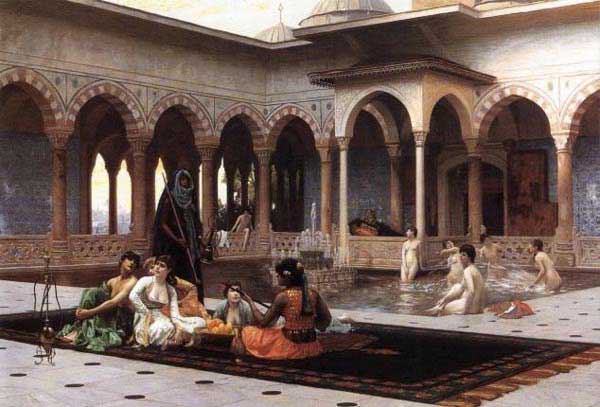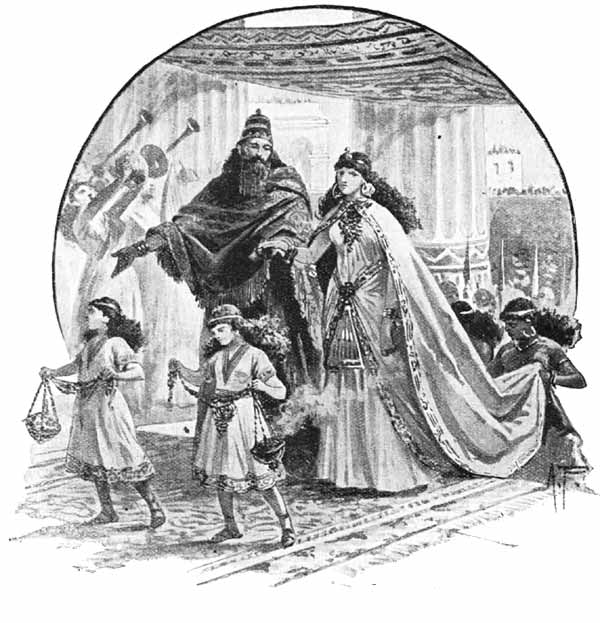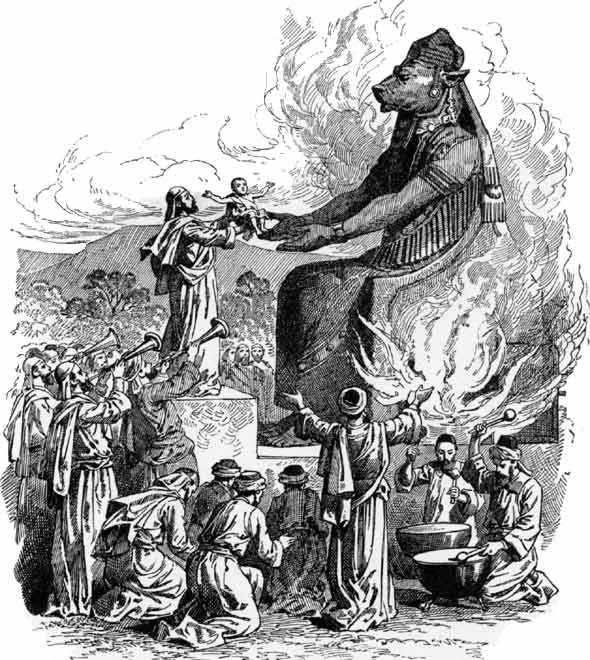King Solomon evidently loved many foreign women including the Queen of Sheba (1 Kings 10:13) besides the harem of 1000 noted as wives and concubines that came from many different peoples. In some cultures, a man could contract concubines as secondary mistresses without marriage and hence these women tended to hold lower status than did the wives. This vast recreational stable was in direct rebellion to the Torah (Deuteronomy 17 below) that contended that if a king multiplied many wives to himself they would turn his heart away to follow other gods as indeed happened here.

A Harem.
The Terrace of the Seraglio.
Jean-Leon Gerome, 1824-1904.
The first of Solomon’s women noted in scripture is Pharaoh’s daughter, and the Torah forbade the Israelites to intermingle with Egyptians. In fact, the Israelites were to have no dealings with the Egyptians whatsoever.
Scripture never names Pharaoh’s daughter and no other records are known to exist. The only wife named is Naamah an Ammonite, the mother of Rehoboam.
Additionally, Solomon took many other foreign wives of the various Canaanite tribes that the Torah also forbade for intermarriage. Many of these alliances are perceived to have been treaties, but the fact that this also was strictly forbidden in the Torah is not to be missed. When one goes directly against the word of the Lord, good results are not to be expected nor were they obtained in this case. Nevertheless, these liaisons augmented by his great temporal wisdom greatly extended the influence of his kingdom upon the world. Despite the fact that God sent many warnings, Solomon did not forsake his hedonism and persisted in collecting wives and mistresses. According to scripture, Solomon was around twelve years old when he married Pharaoh’s daughter and she seems to have been his first wife.
1 Kings 3:1 And Solomon became allied to Pharaoh king of Egypt by marriage, and took Pharaoh's daughter, and brought her into the city of David, until he had made an end of building his own house, and the house of the Lord, and the wall of Jerusalem round about. (JPS) (Emphasis added)
Not only did the Torah forbid marriages with Egyptians, but it also forbade making treaties, agreements or dealings of any kind with Egyptians. The same prohibitions also existed concerning the peoples of whom most of the rest of Solomon’s harem derived their ancestries. In fact, the Israelites were supposed to completely eradicate the Canaanites from the land.
Numbers 33:51 “Speak to the Israelites and say to them: ‘When you cross the Jordan into Canaan, 52 drive out all the inhabitants of the land before you. Destroy all their carved images and their cast idols, and demolish all their high places. (NIV)
Numbers 33:55 “‘But if you do not drive out the inhabitants of the land, those you allow to remain will become barbs in your eyes and thorns in your sides. They will give you trouble in the land where you will live. 56 And then I will do to you what I plan to do to them. ’” (NIV)
1 Kings 11:1 Now king Solomon loved many foreign women, besides the daughter of Pharaoh, women of the Moabites, Ammonites, Edomites, Zidonians, and Hittites; 2 of the nations concerning which the Lord said unto the children of Israel: 'Ye shall not go among them, neither shall they come among you; for surely they will turn away your heart after their gods'; Solomon did cleave unto these in love. 3 And he had seven hundred wives, princesses, and three hundred concubines; and his wives turned away his heart. 4 For it came to pass, when Solomon was old, that his wives turned away his heart after other gods; and his heart was not whole with the Lord his God, as was the heart of David his father. (JPS) (Emphasis added)
Notice that 1 Kings 11:4 states that “when Solomon was old, that his wives turned away his heart after other gods;” however, it does not say how old. One of the first things Solomon did was marry Pharaoh’s daughter at the age of twelve, so this was apparently how old. While this might seem to be a stretch, the rabbinical sages known as the Tannaim contend that Pharaoh’s daughter was instrumental in Solomon’s demise and that it began immediately. The Tannaim were the sages that redacted the Mishnah. There is some conflicting information about this and some sages contend that Solomon married her when the temple was completed. Nevertheless, she seems to have been on hand during the construction of the temple (1 Kings 3:1).
2 Chronicles 8:11 And Solomon brought up the daughter of Pharaoh out of the city of David unto the house that he had built for her; for he said: 'No wife of mine shall dwell in the house of David king of Israel, because the places are holy, whereunto the ark of the Lord hath come.' (JPS) (Emphasis added)
In 2 Chronicles 8:11, notice that Solomon says to himself that his wife must not dwell in the places where the ark had been because those places were holy. So then, one could correctly conclude that his wives were unholy. The point is that Solomon should not have married an Egyptian or a Canaanite under any circumstances. Regarding Egypt, scripture states: “Ye shall not return again any more that way.” Israel was to have no contact with Egypt whatsoever. It is notable that 2 Chronicles 8:11 mentions that Solomon built a house for Pharaoh’s daughter and she appears to be the only wife with her own palace.

Solomon brought up the daughter of Pharaoh.
2 Chronicles 8:11 And Solomon brought up the daughter of Pharaoh
out of the city of David unto the house that he had built for her...
Further historical records of the Tannaim contend that Pharaoh’s daughter brought Solomon 1000 musical instruments, each of which were used in the worship of a particular idol. The Bible contends that Solomon descended into idolatry and built facilities for all of his idolatrous wives. Scripture maintains that he built a high place for Chemosh on the Mount of Olives as well as facilities for Molech, Milcom and the rest of his infernal pantheon. The sages contend that the facility on the Mount of Olives was in continuous use for over 400 years. The orgiastic worshipers of these entities practiced human sacrifice by the means of burning one’s infants to death. This accounts for the scant scriptural mention of Solomon’s descendents.
1 Kings 11:7 On a hill east of Jerusalem, Solomon built a high place for Chemosh the detestable god of Moab, and for Molek the detestable god of the Ammonites. 8 He did the same for all his foreign wives, who burned incense and offered sacrifices to their gods. (NIV)
Deuteronomy 17:2 If there be found in the midst of thee, within any of thy gates which the Lord thy God giveth thee, man or woman, that doeth that which is evil in the sight of the Lord thy God, in transgressing His covenant, 3 and hath gone and served other gods, and worshipped them, or the sun, or the moon, or any of the host of heaven, which I have commanded not; 4 and it be told thee, and thou hear it, then shalt thou inquire diligently, and, behold, if it be true, and the thing certain, that such abomination is wrought in Israel; 5 then shalt thou bring forth that man or that woman, who have done this evil thing, unto thy gates, even the man or the woman; and thou shalt stone them with stones, that they die. (JPS) (Emphasis added)
Malachi 2:10 Have we not all one father? Hath not one God created us? Why do we deal treacherously every man against his brother, profaning the covenant of our fathers? 11 Judah hath dealt treacherously, and an abomination is committed in Israel and in Jerusalem; for Judah hath profaned the holiness of the Lord which He loveth, and hath married the daughter of a strange god. 12 May the Lord cut off to the man that doeth this, him that calleth and him that answereth out of the tents of Jacob, and him that offereth an offering unto the Lord of hosts. 13 And this further ye do: ye cover the altar of the Lord with tears, with weeping, and with sighing, insomuch that He regardeth not the offering any more, neither receiveth it with good will at your hand. 14 Yet ye say: 'Wherefore?' Because the Lord hath been witness between thee and the wife of thy youth, against whom thou hast dealt treacherously, though she is thy companion, and the wife of thy covenant. (JPS) (Emphasis added) (Emphasis added)

Solomon Worships Moloch.
King Solomon's Worshipful Offering to Molech.
Illustration from the 1897 Bible Pictures and What They Teach Us by Charles Foster.
Moreover, 1 Kings 3:1 contends that this marriage was intended to be a type of treaty between Pharaoh and Solomon and this was another thing that was not to be done under any circumstances. Making treaties with most other nations was forbidden for Israel just as even visiting with Egyptians was. In fact, this is still the case today. This is not the only forbidden treaty that Solomon made either. He also made a treaty with Hiram King of Tyre (1 Kings 5:12), king of one of the nations that should have been driven out of the land before the Israelites.
Exodus 23:31 And I will set thy border from the Red Sea even unto the sea of the Philistines, and from the wilderness unto the River; for I will deliver the inhabitants of the land into your hand; and thou shalt drive them out before thee. 32 Thou shalt make no covenant with them, nor with their gods. 33 They shall not dwell in thy land--lest they make thee sin against Me, for thou wilt serve their gods--for they will be a snare unto thee. (JPS) (Emphasis added)
Exodus 34:12 Take heed to thyself, lest thou make a covenant with the inhabitants of the land whither thou goest, lest they be for a snare in the midst of thee. 13 But ye shall break down their altars, and dash in pieces their pillars, and ye shall cut down their Asherim. 14 For thou shalt bow down to no other god; for the Lord, whose name is Jealous, is a jealous God; (JPS) (Emphasis added)
Deuteronomy 17:16 Only he shall not multiply horses to himself, nor cause the people to return to Egypt, to the end that he should multiply horses; forasmuch as the Lord hath said unto you: 'Ye shall henceforth return no more that way.' 17 Neither shall he multiply wives to himself, that his heart turn not away; neither shall he greatly multiply to himself silver and gold. (JPS) (Emphasis added)
The following passage records the words of Ezra and it is an excerpt of the Prayer of Ezra on the return of the remnant of Jews from the Babylonian captivity.
Ezra 9:10 And now, O our God, what shall we say after this? for we have forsaken Thy commandments, 11 which Thou hast commanded by Thy servants the prophets, saying: The land, unto which ye go to possess it, is an unclean land through the uncleanness of the peoples of the lands, through their abominations, wherewith they have filled it from one end to another with their filthiness. 12 Now therefore give not your daughters unto their sons, neither take their daughters unto your sons, nor seek their peace or their prosperity for ever; that ye may be strong, and eat the good of the land, and leave it for an inheritance to your children for ever. 13 And after all that is come upon us for our evil deeds, and for our great guilt, seeing that Thou our God hast punished us less than our iniquities deserve, and hast given us such a remnant, 14 shall we again break Thy commandments, and make marriages with the peoples that do these abominations? wouldest not Thou be angry with us till Thou hadst consumed us, so that there should be no remnant, nor any to escape? 15 O the Lord, the God of Israel, Thou art righteous; for we are left a remnant that is escaped, as it is this day; behold, we are before Thee in our guiltiness; for none can stand before Thee because of this.' (JPS) (Emphasis added)
1 Kings 11:1 Now king Solomon loved many foreign women, besides the daughter of Pharaoh, women of the Moabites, Ammonites, Edomites, Zidonians, and Hittites; 2 of the nations concerning which the Lord said unto the children of Israel: "Ye shall not go among them, neither shall they come among you; for surely they will turn away your heart after their gods"; Solomon did cleave unto these in love. 3 And he had seven hundred wives, princesses, and three hundred concubines; and his wives turned away his heart. 4 For it came to pass, when Solomon was old, that his wives turned away his heart after other gods; and his heart was not whole with the Lord his God, as was the heart of David his father. 5 For Solomon went after Ashtoreth the goddess of the Zidonians, and after Milcom the detestation of the Ammonites. 6 And Solomon did that which was evil in the sight of the Lord, and went not fully after the Lord, as did David his father. 7 Then did Solomon build a high place for Chemosh the detestation of Moab, in the mount that is before Jerusalem, and for Molech the detestation of the children of Ammon. 8 And so did he for all his foreign wives, who offered and sacrificed unto their gods. 9 And the Lord was angry with Solomon, because his heart was turned away from the Lord, the God of Israel, who had appeared unto him twice, 10 and had commanded him concerning this thing, that he should not go after other gods; but he kept not that which the Lord commanded. (JPS) (Emphasis added)